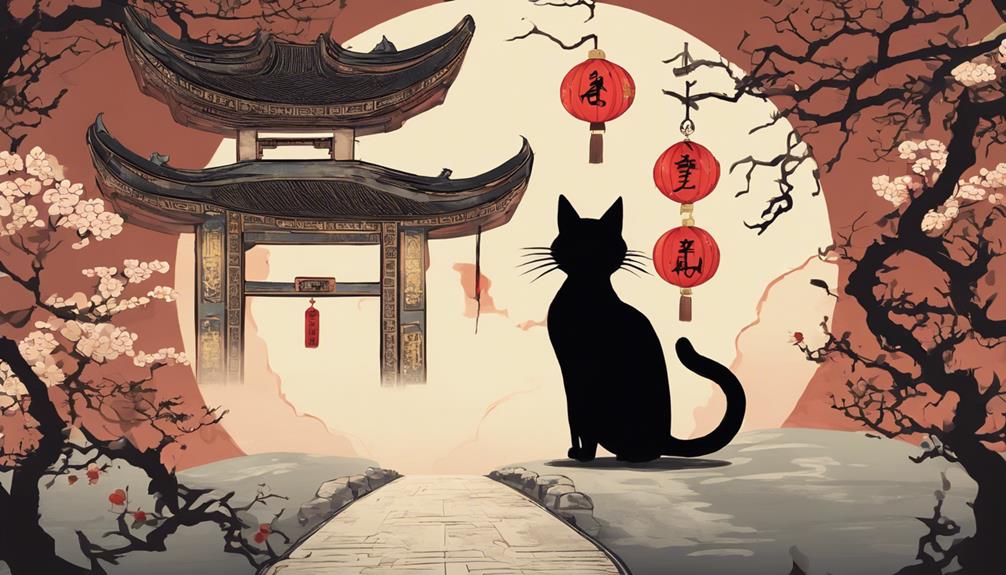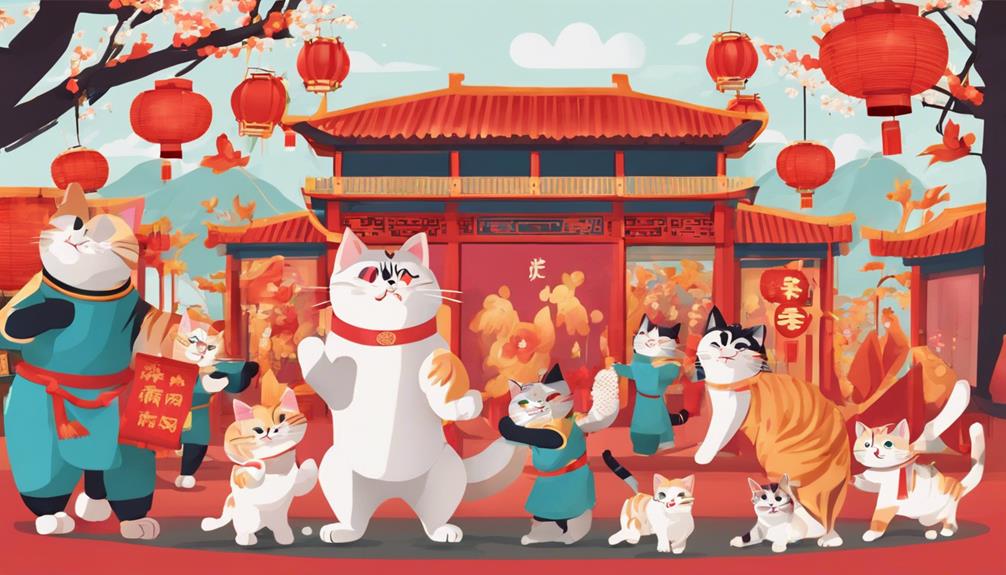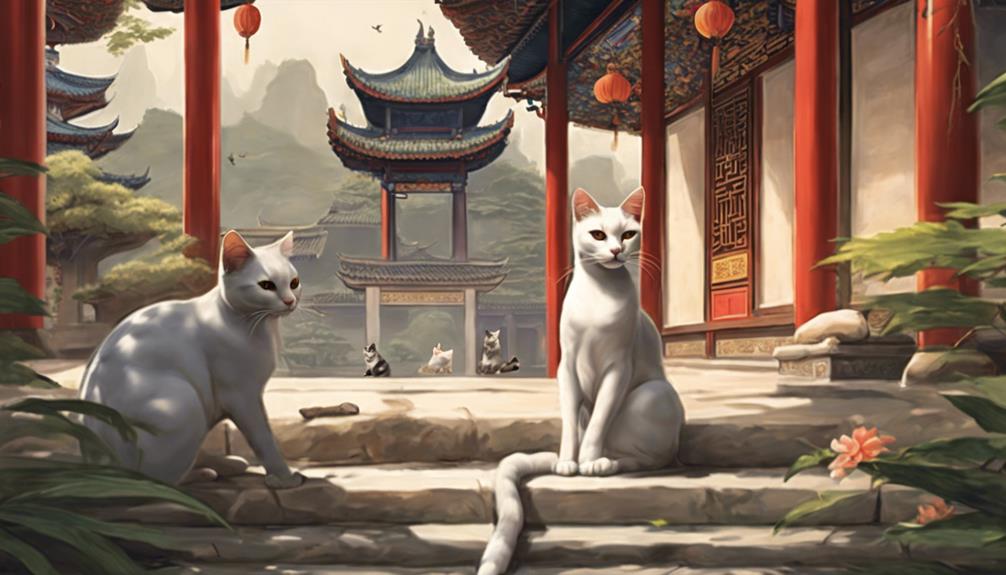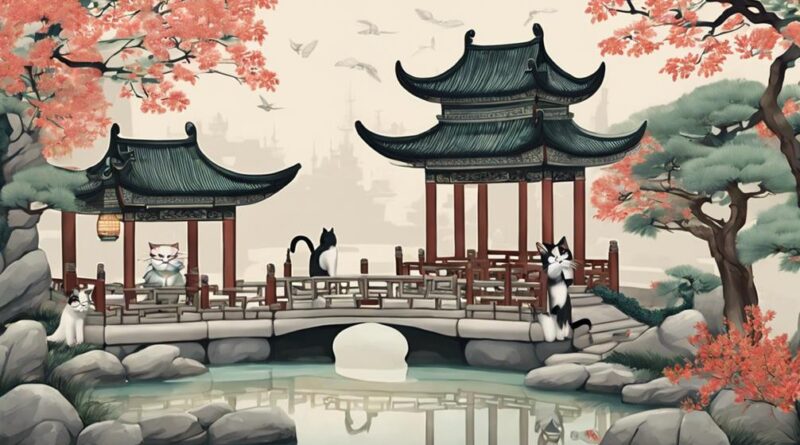12 Fascinating Insights: Cats in Chinese History & Culture
Explore the mystical world of cats in Chinese history and culture. Cats were revered for their supernatural powers and ties to luck and protection in ancient China. Symbolizing prosperity and good fortune, cats like the beckoning Maneki-neko brought positive energy. They inspired art, literature, and even traditional Chinese medicine practices. The significance of cat colors and behaviors in superstitions and proverbs reflects their mysterious and intuitive nature. From majestic cat festivals to modern cat cafes and online communities, cats continue to hold a special place in Chinese society. Uncover more about the fascinating insights into cats in Chinese history and culture.
Ancient Chinese Beliefs About Cats
In ancient Chinese culture, cats were revered for their mystical qualities and seen as symbols of luck and protection. The cultural significance of cats in ancient China extended beyond mere companionship; they were deeply intertwined with various folklore tales and spiritual beliefs. Cats were believed to possess a special connection to the spiritual realm, acting as guardians against evil spirits and bringing good fortune to their owners.
Folklore tales often depicted cats as mystical creatures with the ability to ward off malevolent forces. These stories reinforced the idea that cats weren't just ordinary animals but rather divine beings capable of protecting their human companions from harm. The ancient Chinese believed that having a cat in the house would bring prosperity and ward off misfortune, making them highly valued and respected animals.
Moreover, cats were associated with certain ancient beliefs that emphasized their role as spiritual protectors. It was believed that cats had the power to sense negative energies and avert disasters before they occurred. This spiritual connection between cats and the unseen world elevated their status in Chinese society, leading people to regard them with reverence and admiration. In essence, the ancient Chinese beliefs about cats reflected a deep-rooted cultural reverence for these enigmatic animals.
Cats in Chinese Mythology
Cats in Chinese Mythology play a significant role in shaping cultural narratives and beliefs surrounding these enigmatic feline creatures. In ancient Chinese mythology, cats were often revered as mystical beings with supernatural powers. One prominent figure is Li Shou, the 'Master of Cats,' who was believed to control pest populations and bring good fortune to households that housed cats. This depiction illustrates the early association between cats and protection in Chinese folklore.
Moreover, cats are also linked to various deities in Chinese mythology. For instance, the goddess Li Shou is depicted with the head of a cat and is considered a guardian of crops, protecting them from rodents. This portrayal symbolizes the dual nature of cats as both hunters and protectors in Chinese culture. Additionally, the cat deity Mao is worshipped in some regions as a symbol of fertility and prosperity, emphasizing the positive attributes assigned to cats in traditional Chinese beliefs.
Throughout Chinese mythology, cats are often portrayed as feline guardians, watching over humans and bringing blessings into their lives. These mystical connections between cats and divine entities highlight the deep-rooted significance of feline companions in Chinese cultural heritage.
Cats as Symbols of Luck
Symbolizing good fortune and prosperity, cats have long been regarded as auspicious creatures in Chinese culture. In Chinese folklore, cats are considered symbols of luck and are believed to bring positive energy into homes. The Maneki-neko, or beckoning cat, is a popular talisman often displayed in shops and homes to attract wealth and good fortune. This figurine, typically depicting a cat with one paw raised, is a well-known symbol of luck in Chinese cultural beliefs.
The color of the cat in Chinese symbolism also holds significance. Black cats are associated with protecting against evil spirits and bringing good luck, while white cats are believed to attract purity and positive energy. The idea of cats as luck symbols is deeply ingrained in Chinese traditions and is reflected in various rituals and practices.
Furthermore, the presence of a cat in Chinese households is thought to bring about prosperity and abundance. It's believed that cats possess a mystical aura that can ward off negative forces and bring about good luck to those around them. This belief in cats as symbols of luck extends beyond just material wealth and encompasses overall well-being and positive outcomes in various aspects of life. The enduring cultural reverence for cats as luck symbols highlights the deep-rooted connection between these feline creatures and the belief in attracting good fortune in Chinese society.
Cats in Chinese Art and Literature
With a rich history and cultural significance, cats have been prominently featured in various forms of artistic expression and written works throughout Chinese history. In Chinese art, cats are often depicted as symbols of good fortune, prosperity, and happiness. Painters have long been inspired by the elegance and mysterious aura of cats, incorporating them into traditional Chinese paintings, ceramics, and sculptures. The graceful movements and enigmatic gaze of cats have served as artistic inspiration for centuries, symbolizing grace, independence, and agility.
In Chinese literature, cats have been portrayed in various ways, reflecting their cultural significance. In traditional Chinese poetry, cats are often associated with beauty, tranquility, and wisdom. Writers have used cats as symbols of elegance and refinement, emphasizing their allure and mysterious nature. Additionally, cats have been featured in folk tales and legends, where they're sometimes depicted as magical creatures with the ability to bring good luck and ward off evil spirits.
Cats in Traditional Chinese Medicine
In the realm of traditional Chinese medicine, felines have long held a significant role that goes beyond mere companionship or artistic inspiration. Cats in acupuncture and herbal remedies for cats have been integral parts of Chinese medicinal practices for centuries. Here's how they've been utilized:
- Acupuncture Points: Cats have been used in acupuncture treatments to help identify specific points on the body. In traditional Chinese medicine, it's believed that these points correspond to different organs and systems in the body. By observing how a cat reacts to pressure or touch on certain areas, practitioners can determine the most effective acupuncture points for treatment.
- Herbal Remedies: Cats have also been a source of inspiration for herbal remedies. Certain herbs that are beneficial for cats' health have been incorporated into traditional Chinese medicine. These herbs are believed to have properties that can help balance the body's energy, treat illnesses, and promote overall well-being. Cat-inspired herbal remedies are often used in conjunction with other treatment methods to achieve holistic healing.
- Energetic Qualities: In traditional Chinese medicine, cats are associated with certain energetic qualities that can be harnessed for therapeutic purposes. Their agility, grace, and independence are thought to influence the way treatments are approached, emphasizing the importance of balance, flexibility, and adaptability in achieving optimal health outcomes.
Famous Cats in Chinese History
Throughout Chinese history, remarkable felines have left a lasting impact on the cultural tapestry of the nation. Cats held significant cultural significance in ancient China, often depicted in historical anecdotes and folklore tales. One notable feline from Chinese history is the legendary cat-faced general, Jiang Shi. According to folklore tales, Jiang Shi was a warrior with exceptional bravery and strategic prowess, leading armies to victory in numerous battles. His cat-like reflexes and keen senses made him a formidable leader on the battlefield, earning him a place in the annals of Chinese history.
Another famous cat in Chinese history is Li Shou. Li Shou was a revered feline known for its role in controlling the pest population in ancient Chinese granaries. Historical anecdotes depict Li Shou as a guardian of the harvest, protecting crops from rodents and ensuring food security for the people. This association with prosperity and abundance elevated the status of cats in Chinese society, leading to their widespread admiration and respect.
These examples illustrate the deep-rooted connection between cats and Chinese culture throughout history. From legendary generals to pest controllers, cats have played diverse and significant roles in shaping the cultural landscape of China, leaving a lasting legacy that continues to be celebrated today.
Cats in Chinese Superstitions

Cats hold a prominent and complex role in Chinese superstitions, influencing various aspects of traditional beliefs and practices. Chinese cat folklore is rich with superstitions about cats that have been passed down through generations.
Here are three intriguing superstitions about cats in Chinese culture:
- Cat Colors: In Chinese superstitions, the color of a cat is believed to hold significant meaning. For instance, black cats are often associated with good luck and prosperity, especially if they've a white spot on their fur. On the other hand, white cats are considered to bring misfortune and are sometimes linked to supernatural occurrences.
- Cat Behavior: The behavior of cats is closely observed in Chinese superstitions as it's believed to foretell future events. If a cat suddenly starts grooming itself excessively, it's thought to signal the arrival of guests. Conversely, if a cat begins to act agitated or restless, it's seen as a warning of impending danger or bad luck.
- Cat Eyes: The eyes of a cat are believed to possess supernatural powers in Chinese folklore. It's said that cats can see spirits and ghosts that are invisible to humans, making them guardians against evil forces. As such, cats with heterochromia (two different colored eyes) are considered to have heightened spiritual abilities.
Cats in Chinese Proverbs
Steeped in centuries-old wisdom and cultural nuances, Chinese proverbs featuring feline companions offer profound insights into life's complexities and human nature. Cats in Chinese proverbs hold significant cultural significance, often intertwined with deep-rooted superstitions and beliefs. In Chinese folklore, cats are portrayed as mystical beings capable of bringing both good and bad fortune, reflecting their dual nature in the proverbs.
One common theme found in Chinese proverbs is the symbolism of cats as mysterious creatures with the ability to see beyond the ordinary. For instance, the proverb 'Like a cat's eyes, seeing through all falsehoods' illustrates the cat's reputed sharp vision and intuition, symbolizing the ability to discern the truth amidst deception. This highlights the Chinese admiration for the cat's perceptiveness and wisdom.
Moreover, cats in Chinese proverbs are often associated with luck and prosperity. The saying 'A cat catches mice to the delight of its owner' conveys the idea of hard work leading to fruitful outcomes, drawing parallels between the cat's hunting prowess and achieving success through diligence. This reflects the positive connotations attributed to cats in Chinese culture, where they're seen as auspicious animals bringing blessings to those around them.
Cat Festivals in Chinese Culture

Diving into the rich tapestry of Chinese cultural traditions, various festivals celebrating the revered feline creatures emerge as vibrant reflections of ancient customs and beliefs. These festivals not only honor cats but also showcase the deep-rooted connection between cats and Chinese society throughout history. Here are three intriguing aspects of cat festivals in Chinese culture:
- Cat Parades: Imagine the bustling streets adorned with colorful decorations, as people gather to witness majestic cat parades. Cats of all breeds, shapes, and sizes strut gracefully alongside their owners, showcasing intricate cat fashion ranging from traditional garments to modern designs. The air is filled with excitement and admiration for these graceful creatures as they parade through the heart of the city, symbolizing good fortune and prosperity.
- Cat Cafes: Step into cozy cat cafes, where the ambiance is filled with the soothing purrs of resident felines. Patrons sip on tea while surrounded by playful cats, enjoying the therapeutic presence of these beloved creatures. In these cafes, cats reign supreme, and visitors revel in the opportunity to interact with them, forming lasting connections that celebrate the beauty of feline companionship.
- Cat Movies: Delve into the world of cinema with captivating cat-themed movies that captivate audiences of all ages. These films explore the mystical aura surrounding cats in Chinese culture, portraying them as symbols of luck, wisdom, and protection. From heartwarming tales of friendship to epic adventures starring heroic felines, cat movies offer a glimpse into the enchanting world of cats as revered beings in Chinese society.
Cats in Chinese Zodiac
Exploring the intricate intertwining of feline symbolism within the Chinese Zodiac reveals a fascinating tapestry of cultural significance and celestial connections. Cats, although not one of the twelve animals in the Chinese Zodiac, hold a special place in modern folklore and societal trends in China. In recent years, the popularity of cat cafes in China has surged, reflecting the admiration and affection people have for these enigmatic creatures. These cafes provide a unique opportunity for individuals to interact with cats, relax, and enjoy their company in a cozy setting.
In Chinese culture, cats are often associated with traits like independence, mystery, and good fortune. While not directly represented in the Zodiac, cats have found their way into various aspects of contemporary Chinese life, becoming symbols of luck and prosperity. Cat-themed merchandise, cafes, and events have become increasingly prevalent, showcasing the enduring appeal of these graceful animals.
Cat cafes in China serve as modern-day shrines to the allure of cats, attracting locals and tourists alike. By blending traditional beliefs with modern practices, these establishments contribute to the ongoing narrative of feline fascination in Chinese society. The presence of cats in the Chinese Zodiac may be absent, but their impact on cultural expressions and daily life is unmistakable.
Cats in Imperial China

During the illustrious era of Imperial China, cats held a revered status that reflected the intricate tapestry of cultural symbolism and societal roles within the imperial court. These imperial felines weren't mere pets but rather esteemed companions that played multifaceted roles in the lives of the imperial families and courtiers.
- Palace Protectors: Imperial cats were believed to possess mystical powers and were often kept in the inner chambers of the palace to ward off evil spirits and bring good fortune to the residents. Their presence was thought to create a harmonious environment conducive to the well-being of the imperial household.
- Symbol of Prosperity: Cats in Imperial China were seen as symbols of prosperity and abundance. Their graceful demeanor and elegant presence were associated with luxury and opulence, making them highly sought after by the elite of society. Owning a cat wasn't only a display of wealth but also a statement of one's refined taste and cultural sophistication.
- Companions of the Elite: These imperial felines weren't only valued for their symbolic significance but also for the companionship they provided to the imperial family members and high-ranking officials. Cats were known to form deep bonds with their owners, offering comfort, loyalty, and a sense of tranquility in the midst of the bustling imperial court life. Their ancient companionship was cherished and celebrated, highlighting the unique bond between humans and these enigmatic creatures in the imperial setting.
Modern-Day Cats in China
In the contemporary landscape of China, the portrayal and role of cats have undergone a notable transformation from their esteemed status in Imperial China. Modern-day China sees a surge in cat cafes, where people can enjoy a cup of tea or coffee while interacting with resident felines. These cafes have become popular social spots, offering relaxation and stress relief to urban dwellers.
Adoption programs have also gained momentum in China, with more people opting to adopt cats from shelters or rescue organizations rather than buying them. This shift reflects a growing awareness of animal welfare and the desire to give abandoned cats a loving home.
The online cat community in China is vibrant and active, with social media platforms filled with cat videos, photos, and discussions. Cat behavior trends, such as training cats to perform tricks or providing them with enriching environments, have become popular topics of interest among cat owners.
Frequently Asked Questions
Are There Any Specific Rituals Involving Cats in Ancient Chinese Ceremonies?
In ancient Chinese ceremonies, cats played a significant role due to their feline symbolism. They were often included in rituals that emphasized their mystical qualities and connections to the spiritual world.
Cats were revered for their grace and agility, believed to bring good luck and ward off evil spirits. Their presence added a sense of mystery and power to these ancient rites, creating a link between the physical and spiritual realms.
How Do Cats Feature in Chinese Funeral Customs and Traditions?
In Chinese funeral customs and traditions, cats hold significant symbolism. They're believed to guide souls to the afterlife and provide comfort to the deceased's spirit.
People mourn their feline companions as a way of honoring their loyalty and companionship. Cats are seen as spiritual beings that bridge the gap between the physical world and the spiritual realm, making their presence essential in Chinese funerary rituals.
What Is the Significance of Cats in Chinese Wedding Traditions?
Cats hold symbolic significance in Chinese wedding traditions. They're often seen as lucky charms, believed to bring blessings and good fortune to the newlyweds. Superstitions surround these feline creatures, with their presence thought to ward off evil spirits and ensure a prosperous marriage.
In Chinese culture, cats are revered for their mysterious aura and protective qualities. This makes them a cherished part of wedding ceremonies.
Are There Any Taboos or Restrictions Related to Owning a Cat in China?
In China, cultural beliefs and superstitions have led to certain restrictions on cat ownership. Some people avoid keeping black cats due to superstitions associating them with bad luck. Additionally, in some regions, there are taboos against certain cat colors or breeds.
These restrictions are rooted in ancient Chinese beliefs and traditions and are still followed by some individuals today, shaping the way cats are perceived and cared for in Chinese society.
Do Cats Play a Role in Traditional Chinese Storytelling or Folk Tales?
In traditional Chinese storytelling and folk tales, cats often symbolize various traits and characteristics. Their behavior, like agility and independence, is frequently depicted in stories to convey specific moral lessons.
Additionally, Chinese superstitions attribute both positive and negative qualities to cats, shaping their role in folklore. Through these tales, cats become integral figures representing different aspects of human nature and values in Chinese culture.
Conclusion
As you reflect on the intricate role of cats in Chinese history and culture, it becomes clear that these feline creatures have left a lasting impact on the country's beliefs, art, literature, and even medicinal practices.
From being revered as symbols of luck to appearing in ancient myths and modern-day celebrations, cats have woven themselves into the fabric of Chinese society. Their presence continues to be a source of fascination and reverence, showcasing the enduring significance of these mysterious and beloved creatures.
